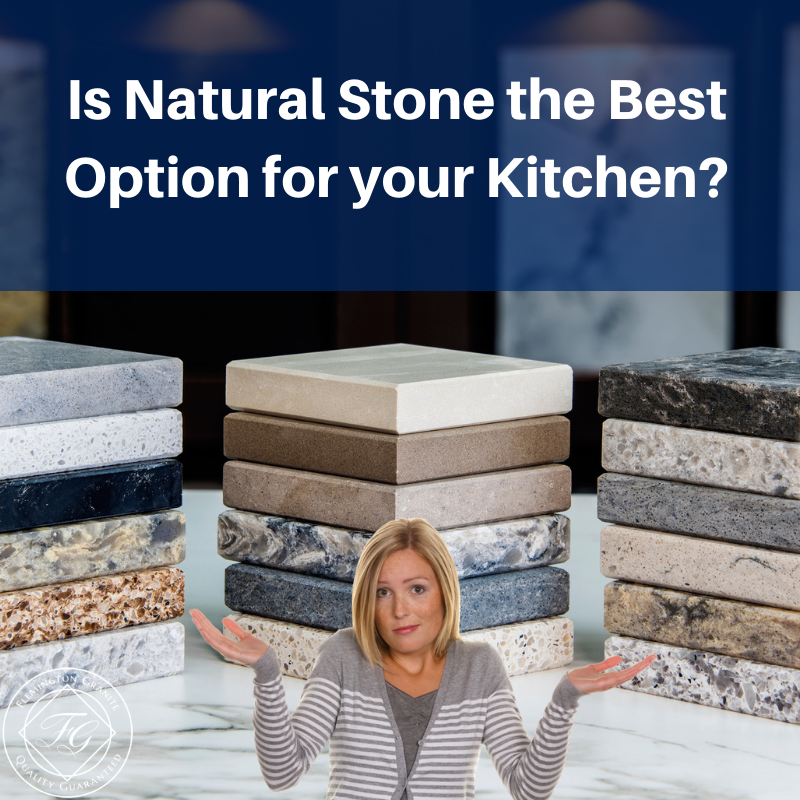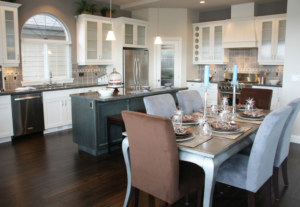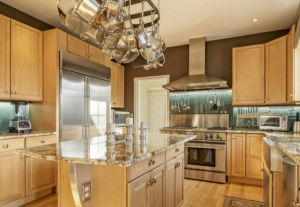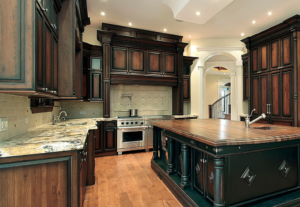
When it comes time to remodel your kitchen or if you are building a new home, deciding the right countertops for your family can be difficult. Today, natural stone is one of the most popular types of counter materials yet even deciding which type of stone can be difficult. These advantages and disadvantages of natural stone as well as descriptions of the various types of stone countertops you can get, can help you make a better informed decision.
Resale Value
One of the biggest advantages to natural stone countertops is the luxurious look it gives your kitchen. When it comes time to sell your home, natural stone will be attractive to buyers due to its durability and minimal maintenance. Even if you don’t plan to sell your home soon, you want to create a kitchen that buyers will fall in love with so that when it is time to sell, you not only recover your investment but sell your home more quickly as well.
Durability and Food Prep Safety
When maintained properly, natural stone counters such as granite or quartz may actually last longer than any other feature in your home. Stone outlasts solid surface, laminate, tile and butcher block, retaining its beauty with very little maintenance. In addition, natural stone can handle even the busiest kitchen without looking worn or damaged. Most natural stones are heat and scratch resistant, unlike solid surface, butcher block or laminate. Because most natural stones are non-porous, they are highly sanitary as bacteria cannot accumulate in the surface. Even stones that are more porous than others, like marble, can resist bacteria if it is sealed properly and the seal is maintained. In addition, if you enjoy baking, marble is the perfect choice as the coolness of the stone works well with pastry.
Low Maintenance
Natural stones are very easy to maintain, requiring only mild soap and water for cleaning. There are some types of stone that require sealing, such as marble and soapstone. The sealant needs to be reapplied every few years. This is not a difficult task and it is possible you can apply the sealant yourself. There are special stone cleaners available that you apply periodically and buff until dry to keep your granite looking brand new. Although stone counters are difficult to scratch, it is important to always use cutting boards as the stone can actually damage your knives.
Granite Countertops
When deciding which stone to use for your counters, it is important to understand what some of the disadvantages of each stone may be. Granite, by far the most popular kitchen counter material, is extremely hard and difficult to scratch. It is porous, however, so it does need to be sealed periodically. If the seal is compromised, some foods could stain your counter. Granite is also only available in colors that can be created by nature and every slab of granite is different. If you have a large counter area, this could mean counters have different veining depending on how you stand in the room.
Quartz Countertops
Another countertop material that is growing in popularity are quartz counters. These are engineered stone countertops created from crushed quartz mixed with coloring and resins to create an extremely hard surface. Because it is engineered, it is available in a wide range of colors. Quartz does not need sealing like other types of natural stone. However, because the stone is mixed with resins, it is not as heat resistant. It is recommended that you always use hot pads and trivets to protect the surface. Many homeowners choose quartz over marble or granite because the stone has a warmer feel than other types of stone.
Marble Countertops
Marble has been used as a building material for centuries. It has a cooler feel than other types of stone which is why it is the perfect surface to work pastry. However, marble is a much softer stone than quartz or granite so it is susceptible to scratching and staining. Red wine, coffee, juices and citrus can damage the counter so spills need to be wiped quickly. Marble also needs to be sealed regularly as well.
Family Lifestyle
One thing to consider when choosing natural stone countertops is how the stone will work with your family. If you have a busy family, granite may be the best option due to its versatility and durability. Choosing a darker granite counter will also help hid stains and small scratches. If you have small children but really love the look of marble, you can find quartz counters that mimic that look but don’t have the staining or scratching issues that marble may have.
Choosing a Finish
Once you have selected the stone that will work best for your family, you will have to choose a finish. Polished stone requires the least maintenance and keeps its beauty the longest. Honed or brushed finishes can be difficult to maintain, especially if you are a busy cook. Some homeowners like the changes that occur in honed or brushed counters over time, thinking that the slight changes make the counters more unique.
Ask to See Individual Slabs
Keep in mind that, other than quartz, which is engineered, each natural stone slab will be different. You can ask to view several different slabs to get a feel for what will work best in your kitchen. A good installer will be able to place the slabs so the veining works well together. By having you look at individual slabs, the fabricator will get an idea what you are looking for when it is time to install.
If you are considering natural stone for your kitchen, contact us today to learn more. Our helpful customer service staff will walk you through the process so you know what to expect every step of the way. With decades of experience, we can create a kitchen that you will love for many years to come. Schedule an appointment today by filling out the easy online form or giving us a call.






